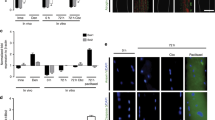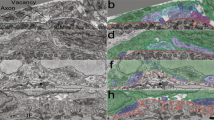Abstract
THE mechanism underlying neural control of skeletal muscle acetylcholinesterase (AChE) is not fully understood1. The experimental evidence points to acetylcholine (ACh)2 and nerve-evoked muscle activity3 as the “trophic” mediators, but neither is sufficient to account for the entire effect of innervation on muscle4. It remains to be seen whether factors such as cell-to-cell contact, and/or some regulatory substance(s) released by motor nerves also contribute to the regulation of AChE activity. In turn, the regulatory substance(s) might be conveyed by axoplasmic transport, for blockage of this process causes denervation-like changes without disturbing neurotransmitter release or the consequent muscle contractile activity5. We report here a reversible change in the activity of endplate AChE that can be ascribed to a temporary interruption of axoplasmic transport.
This is a preview of subscription content, access via your institution
Access options
Subscribe to this journal
Receive 51 print issues and online access
$199.00 per year
only $3.90 per issue
Buy this article
- Purchase on Springer Link
- Instant access to full article PDF
Prices may be subject to local taxes which are calculated during checkout
Similar content being viewed by others
References
Guth, L., Physiol. Rev., 48, 645–687 (1968).
Drachman, D. B., J. Physiol., Lond., 226, 619–627 (1972).
Walker, C. R., and Wilson, B. W., Nature. 256, 215–216 (1975).
Drachman, D. B., Ann. N. Y. Acad. Sci., 228, 160–176 (1974).
Albuquerque, E. X., Warnick, J. E., Tasse, J. R., and Sansone, F. M., Expl. Neurol., 37, 607–634 (1972).
Fernandez, H. L., and Ramirez, B. U., Brain Res., 79, 385–395 (1974).
Hall, Z. W., and Kelly, R. B., Nature new Biol., 232, 62 (1971).
Wilson, S. H., et al. J. biol. Chem., 247, 3159–3169 (1972).
Fernandez, H. L., Huneeus, F. C., and Davison, P. F., J. Neurobiol., 1, 395–409 (1970).
Rodriguez-E, E., Ramirez, B. U., and Fernandez, H. L., J. Neurocytol., 2, 149–156 (1973).
Lømo, T., Nature, 249, 473–474 (1974).
Lentz, T. L., Expl. Neurol., 45, 420–426 (1974).
Guth, L., Brown, W. C., and Watson, P. K., Expl. Neurol., 18, 443–452 (1967).
Jacobson, M., Devl Neurobiol. 275 (Holt, Rinehart and Winston, New York, 1970).
Lowry, O. H., Rosebrough, N. J., Farr, A. L., and Randall, R. J., J. biol. Chem., 193, 265–275 (1951).
Snyder, D. H., Rifenberick, D. H., and Max, S. R., Expl. Neurol., 40, 36–42 (1973).
Author information
Authors and Affiliations
Rights and permissions
About this article
Cite this article
FERNANDEZ, H., INESTROSA, N. Role of axoplasmic transport in neurotrophic regulation of muscle end plate acetylcholinesterase. Nature 262, 55–56 (1976). https://doi.org/10.1038/262055a0
Received:
Accepted:
Issue Date:
DOI: https://doi.org/10.1038/262055a0
This article is cited by
-
Properties of 16S acetylcholinesterase from rat motor nerve and skeletal muscle
Neurochemical Research (1981)
-
Acetylcholinesterase like that of skeletal muscle in smooth muscle reinnervated by a motor nerve
Nature (1979)
-
Release of acetylcholinesterase from rat hemidiaphragm preparations stimulated through the phrenic nerve
Nature (1978)
Comments
By submitting a comment you agree to abide by our Terms and Community Guidelines. If you find something abusive or that does not comply with our terms or guidelines please flag it as inappropriate.



